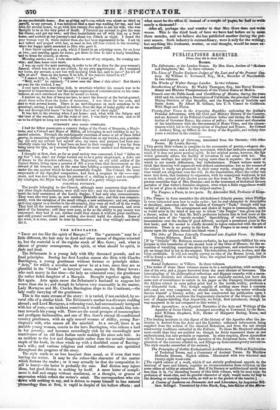THE DiBUTANTE.
"Thou art too like the spirit of Banquo I " The "garments" may be a little different, the hair may be dyed and other means of disguise resorted .to, but the material is of the regular stock of Mrs. Gore; and, what is almost of greater consequence, the spirit, or what should be spirit, is 'fade and fecal.
The Debutante is a young lady with fifty thousand pounds, and no fixed principles. During her first London season she flirts with Charles Barrington, a young gentleman without fortune or principle either. "Arts," for which a novelist need never be at a loss, since they are as -.plentiful in the " books " as lawyers' cases, separate the flimsy lovers ; ,who each marry in due time—the lady an exhausted roué, the gentleman the rather faded daughter of a Marquis. Brought together again, they flirt again. Arts again cause the Debutante's husband to suppose her worse than she is ; and though he behaves very reasonably in the matter, Lady Mortayne and Mr. Charles Barrington elope to the Continent,—the lady really carrying off the gentleman. This is the main stream of the story: it is varied, if not enriched, by se- veral rills of a similar kind. The Debutante's mother is a divorcée residing abroad; and Lord Mortayne, a reforming roue, had unconsciously intrigued with her of yore —an incident contrived, it would seem, to make him tole- rant towards his young wife. There are the usual groupes of commonplace
• and profligate fashionables, and one of Mrs. Gores eternal ill-conditioned country gentlemen, with an ugly soured woman of ability, young Bar- rington's wife, who causes all the mischief. As a set-off, there is an amiable young woman, cousin to the hero Barrington, who refuses a lord in her poverty, and becomes exceedingly rich by the exceedingly new • Contrivance of an old East Indian uncle making his niece sole heir. As WI antidote to the low and disagreeable rather than the actually immoral staple of the book, its close winds up with a deathbed scene of Barring- ton's wife; and various religious and ethical reflections are sprinkled . throughout the progress of the story. The style reads to us less buoyant than usual, as if even that were leaving the writer. It may be the refuse-like character of the matter , which flattens the reader ; or it may actually be that the composition it- self is heavy—the latter is probably the case. Bad diction may injure ideas, but good diction is nothing by itself. A mere letter of compli- ment is dull and empty without sentiment, or a thought, or graces of expression which reflect the writer's mind. The correspondent who sits down with nothing to say, ad is driven to repeat himself in less natural phraseology than at first, is vapid in despite Of his hollow efforts : and what must be the effect if, instead of a couple of pages, he had to write nearly a thousand ?
After all, perhaps the real wonder is that Mrs. Gore does not write worse. This is the third book of hers we have had before us in some three months, and we believe she has published another during the pre- sent season. Such industry is extraordinary, were it only for the writing; but anything like freshness, matter, or real thought, would be more ex- traordinary still.


























 Previous page
Previous page